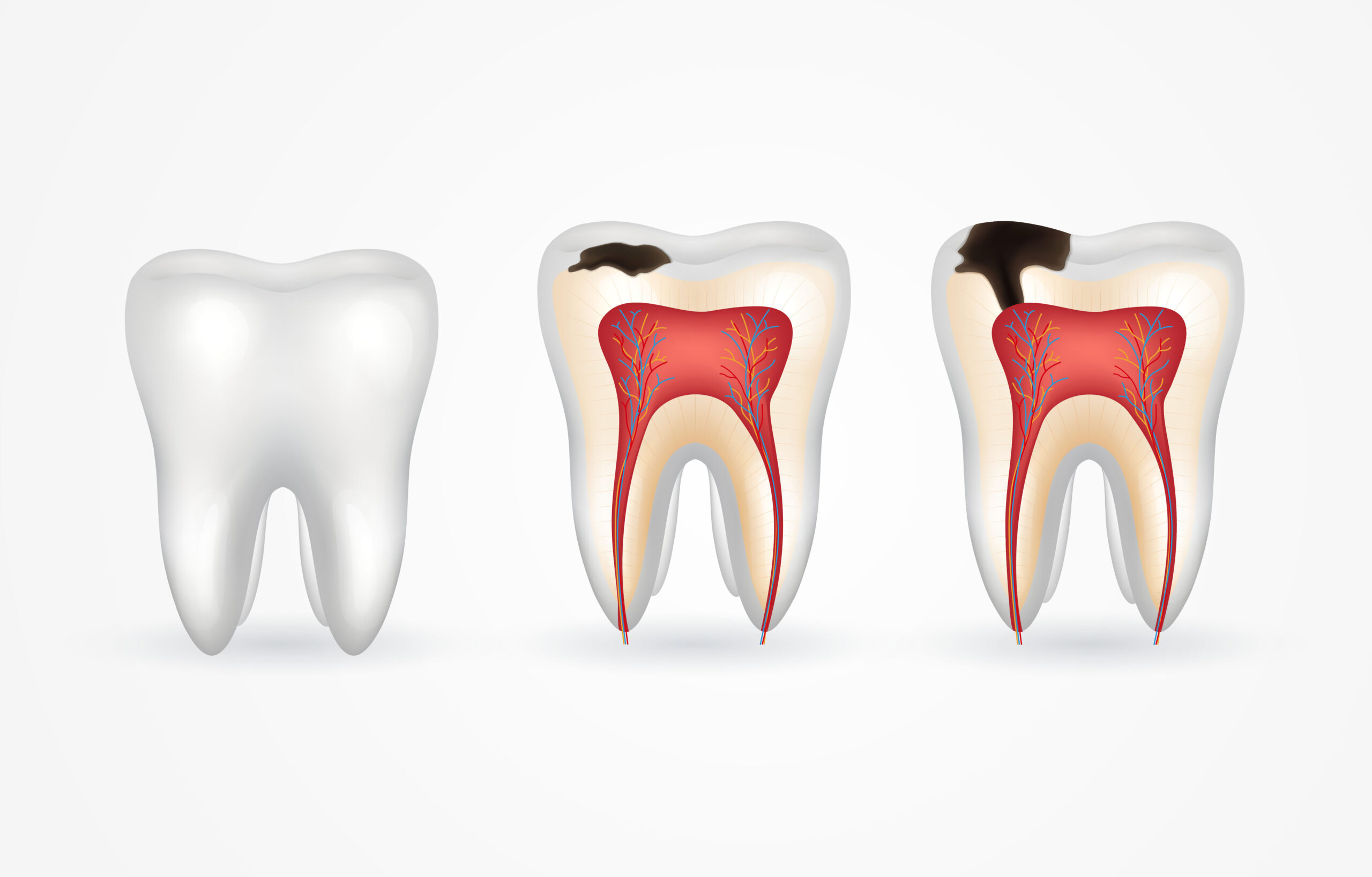1. Initial Demineralization:
This initial stage involves acid erosion affecting the enamel, leading to the appearance of white spots.

Welcome to Figtree Dental, your trusted dental care provider in Figtree, NSW. We understand how vital good oral health is to your overall well-being. Tooth decay is a common dental issue we see frequently, and our dedicated team is here to provide effective and compassionate treatments to restore your smile.
Tooth decay, also known as dental caries or cavities, is a prevalent dental condition caused by the erosion of tooth enamel due to acids produced by bacteria. This process often begins with plaque buildup and can lead to cavities if not addressed promptly. Tooth decay affects individuals of all ages and can result in significant pain and dental complications.
Detecting the early signs of tooth decay is essential for preventing more serious damage and extensive treatments. Common symptoms include:
This initial stage involves acid erosion affecting the enamel, leading to the appearance of white spots.
Continued demineralization results in the degradation of enamel, forming cavities.
Decay advances into the dentin layer, causing increased pain and sensitivity.
Infection affects the pulp, often resulting in severe pain and necessitating more extensive treatment.
If the infection reaches the root, it can lead to an abscess, characterized by swelling and intense discomfort.
At Figtree Dental, we take a comprehensive and personalized approach to treat tooth decay:
We educate patients on proper oral hygiene and conduct regular dental check-ups to prevent decay.
We apply fluoride to strengthen enamel and prevent the early stages of decay.
We remove decayed material and fill cavities with composite resin or other suitable materials.
Crowns are placed on damaged teeth to restore their shape, size, and function.
We remove infected pulp to save the tooth and relieve pain.
In severe cases, we may remove the affected tooth to prevent further issues.
Selecting the right dental practice for managing tooth decay is crucial for effective treatment and a positive experience. Here’s what makes Figtree Dental unique:
Our dentists and hygienists have extensive experience in all aspects of tooth decay management.
We utilize state-of-the-art diagnostic tools and treatment methods to ensure optimal outcomes.
Your comfort is our priority; we create customized treatment plans tailored to your specific needs.
We offer a wide range of dental services, from preventive care to complex procedures, all in one location.
As a trusted dental provider in Figtree, we are committed to the health and well-being of our local community.
Tooth decay occurs when acids produced by bacteria in plaque gradually damage tooth enamel.
Tooth decay arises from various factors, including bacteria, sugary food and drink consumption, and poor oral hygiene.
To prevent tooth decay, brush twice daily, floss regularly, limit sugary snacks and drinks, and schedule routine dental check-ups.
Early indicators include white spots on teeth, increased sensitivity to temperature changes, and persistent bad breath.
Dentists typically diagnose tooth decay through visual examination and may use X-rays for a more detailed assessment.
Treatment options include fluoride treatments, dental fillings, crowns, root canals, and extractions.
Early stages of tooth decay can potentially be reversed with fluoride treatments and improved oral hygiene.
Regular dental check-ups and cleanings every six months are recommended to help prevent tooth decay.
Yes, children are particularly susceptible to tooth decay, especially if they consume sugary foods and drinks.
To help prevent tooth decay, it’s best to limit sugary snacks, candies, sodas, and sticky foods that cling to teeth.
Yes, untreated tooth decay can lead to infections, abscesses, and affect overall health.
A cavity is a hollow area in a tooth that forms due to decay.
Cavities are treated by removing the decayed area and filling the space with a dental material.
Dentists use local anesthesia to minimize discomfort during the filling process.
Common filling materials include composite resin, amalgam, gold, and porcelain.
While good oral hygiene can help prevent decay, existing decay needs professional dental treatment.
Yes, severe tooth decay can lead to gum disease and other periodontal issues.
Plaque is a sticky film of bacteria that forms on teeth and contributes to tooth decay.
Regular brushing, flossing, and routine dental cleanings are effective in eliminating plaque buildup.
Tartar is hardened plaque that forms on teeth and can only be removed by a dental professional.
While the bacteria that cause tooth decay can be transmitted through saliva, tooth decay itself is not contagious.
Yes, untreated tooth decay can eventually result in tooth loss.
Brushing too aggressively can damage enamel and gums, making teeth more vulnerable to decay.
Fluoride mouthwash can help prevent decay but should not replace brushing and flossing.


